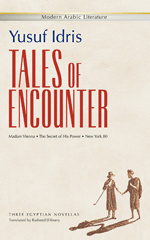By Chitra Kalyani
Jazz is one surprise after another; it is to be expected.
Dressed in a black evening dress with detached sleeves, the star, featured by the recently-formed group the Amro Salah Trio, walks on stage with an unusual accessory: her eyeglasses. But when you welcome onstage the voice that is Elisa Nocita, for minutes you hold your breath and your pen in wonder. And you tell yourself you knew it, how else could she have pulled off the eyewear?
Salah’s new project was conceived in 2010 to perform new interpretations of jazz classics along with original compositions. Unlike Eftekesat, the Trio provides more willing accompaniment to jazz vocalists, and has previously featured Noha Fekry in their performances.
The Trio, composed of Salah (piano/keyboards), Ehab Tass (bass), and Ahmed Hesham (drums), is accompanied by percussionist Diaa Tass as they open the night with two instrumental numbers. The first ripple belongs to the piano, played by Amro Salah, teasing out rich full sounds that fill the open air theater at the Cairo Opera House on Monday.
The Sicilian singer opens her act with songs from Brazil, with its sounds of salsa and Bossa Nova, the “new trend” that brought dreams to jazz in the 1960s. The Italian singer opens her act with Antonio Carlos Jobim’s “Fotografia,” delivered with an unhurried confidence that underlines her expertise and your surprise.
With equal skill, she sways away from Jobim’s hypnotic and dreamy melody to a sprightly João Gilberto number, “O Pato.”
Ahmed Medhat, who also performs with Amro Salah in Eftekesat, provides Nocita’s vocals with a beautifully romantic yet skillfully restrained violin accompaniment.
Meanwhile, Nocita’s vocal talents reveal a range, from the operatic, which can verge on the dramatic, to the more perky sounds of bebop and samba. Her gift for scatting shines as she improvises syllables “One Note Samba,” another ode by the Brazilian virtuoso Jobim.
Given such feisty talent, one remains painfully aware of the modest attendance, and the paucity of venues, and especially of the shame that does not lend itself to dancing. The two hour run of the concert was perhaps a little too long for a sit-down affair.
Yet Nocita remains undeterred, dancing her way and voice across stage and producing improvisations. In a playful interlude into scat singing, she strums out notes on Jorge Ben’s “Mas Que Nada” that the other instruments followed, or vice versa. Medhat, the violinist, later revealed that the performance was fully improvised, and in fact, the band had only rehearsed with the singer only once, and that was a month ago.
Holding a large “tammora” drum, Nocita offers a taste of folk music from her native Italy with “Tamurriata Nera,” a traditional song hailing from Napoli. The voice begins with appropriate weightiness, older than its bearer, a medium of wisdom handed from another generation. Yet, too soon perhaps, the mood grows self-indulgent, borne down with its own heaviness.
Producing a forgettable rendition of blues classic “Route 66,” Nocita reveals that English may not be her forte. But through “Besame Mucho,” she produces vocal variations that reveal the makings of an accomplished jazz vocalist.
An added surprise was her rendition of Fayrouz’s “Sabah we Masah” (Day and Night). It made one wonder if she was all too astute in her self-assessment.
“Maybe I was born in the wrong place,” Nocita told Daily News Egypt, admitting to her attraction to mawwali and naqshbandi music prevalent in the Arab world.
“I have a dream to sing in Arabic,” said the artist, who previously lived in Egypt, and is on her way to producing songs with Nabil Gouda, who has also composed for the renowned Egyptian singer Mohamed Mounir.
Before she comes back in December, Nocita will be lending her vocals to a movie soundtrack in Italy. The name of the movie is still a mystery, but with Elisa Nocita, you can certainly expect a surprise.
Visit http://www.myspace.com/elisanocita for more information on the artist. For more information on the Amro Salah trio visit http://www.amrosalah.com/.



